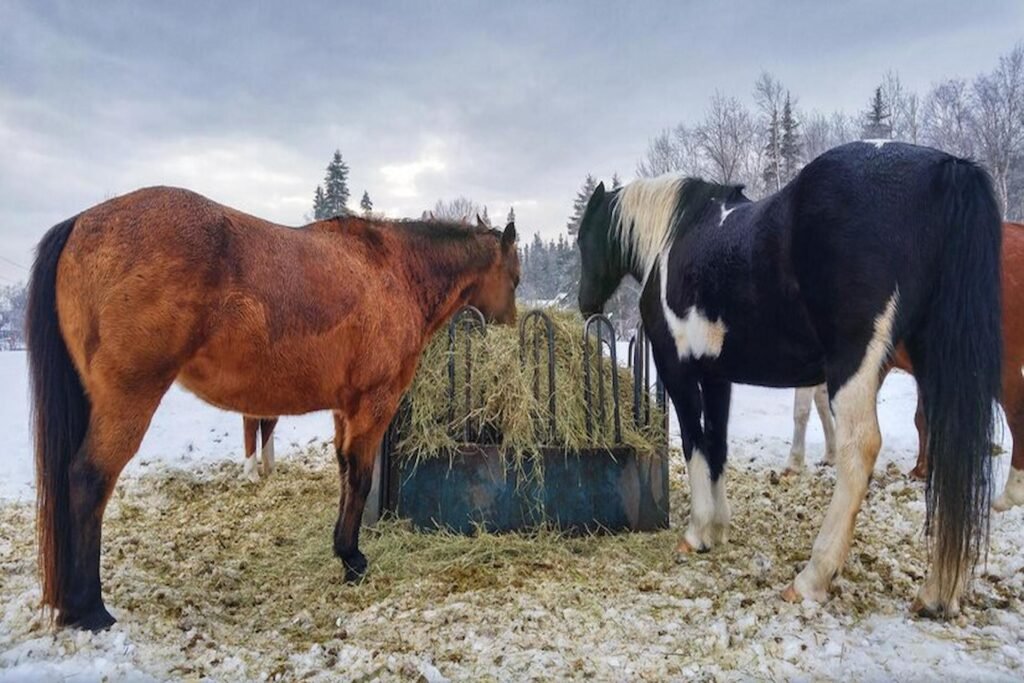Alfalfa is a perennial flowering plant belonging to the legume family. It has been cultivated for centuries as a valuable forage crop due to its exceptional nutritional content and adaptability to various climates. Originally native to Asia and Europe, alfalfa is now widely grown across the world, including in North America, where it serves as a staple component of many horse diets.
This legume plant is characterised by its deep root system, which enables it to access nutrients deep within the soil, resulting in its rich nutritional profile. Alfalfa typically grows in dense clusters with clusters of small purple flowers and distinctive trifoliate leaves. In the US, alfalfa is harvested primarily for its nutrient-dense hay, whilst in the UK, alfalfa has become a favoured choice as a chopped fibre among horse owners and livestock producers seeking to enhance the dietary quality of their animals.
Nutritional Value
Alfalfa’s exceptional nutritional value is a key reason why it is favoured in equine diets. Alfalfa is renowned for its high protein content, providing horses with essential amino acids crucial for muscle development, repair, and overall health. This protein richness makes alfalfa particularly beneficial for young, growing horses whose bodies require ample protein for proper growth, as well as for pregnant mares needing additional support during gestation and lactation. For hardworking equine athletes, alfalfa offers a natural source of high-quality protein to aid in muscle maintenance and recovery after intense exercise.
In addition to its protein content, alfalfa is a powerhouse of essential minerals, notably calcium. Calcium is vital for maintaining strong bones and teeth in horses, supporting overall skeletal health, and reducing the risk of growth problems as part of a balanced diet. The calcium-to-phosphorus ratio in alfalfa is also advantageous, helping to maintain a balanced mineral intake critical for optimal growth and development, particularly in young horses. Furthermore, alfalfa contains significant levels of vitamins A, D, E, and K, which are important for various aspects of equine health, including eyesight, immune function, and overall vitality.
The presence of these essential nutrients in alfalfa makes it a beneficial component of a horse’s diet. The combination of protein, calcium, and vitamins in alfalfa supports not only the physical development and maintenance of horses but also their overall well-being and performance. By incorporating alfalfa as part of a balanced feeding regimen, horse owners can help to make sure their animals receive the necessary nutrients for optimal health and vitality throughout all stages of life.
Digestibility and Palatability
Alfalfa’s digestibility is another key benefit for horses. Compared to straw-based chopped fibre feeds, alfalfa may be more palatable, which may be preferable for picky eaters. The soft, leafy nature of alfalfa can make it easier for horses to chew and digest. It is also often available in a pelleted form, which can be soaked before feeding and can be a great choice for older horses with dental issues.
The high digestibility of alfalfa also means that horses can efficiently extract nutrients from this forage, promoting gut health. Ensuring sufficient forage is consumed is also important for reducing the risk of digestive disturbances like colic. For horses needing to maintain weight or those in demanding training regimens, the digestibility of alfalfa can help to ensure they receive sufficient energy and nutrients from their feed.
Supports Hydration and Electrolyte Balance
Alfalfa contains essential electrolytes such as potassium, which plays a crucial role in nerve and muscle function. For horses in work, providing an alfalfa-based feed as part of a balanced diet alongside a sufficient water intake and an electrolyte supplement will help them to maintain proper hydration levels and electrolyte balance, especially beneficial for performance horses undergoing rigorous training or competition schedules.
Natural Source of Fiber
Fibre is essential for maintaining digestive health in horses, and alfalfa is an excellent source of high-quality dietary fibre. A high fibre intake is important for proper digestion and is particularly important for horses prone to colic and gastric ulcers. Unlike cereal grains, alfalfa provides fibre and slow-release energy whilst keeping starch levels low, making it a preferable choice for horses who require a low starch diet for health reasons.
The fibrous nature of alfalfa also supports a healthy hindgut environment.
Alfalfa-based horse feed offers plenty of benefits that contribute to the overall health, performance, and well-being of equine athletes and companion horses alike. From its rich nutritional content to its digestibility, alfalfa remains a staple for many horse owners seeking to optimise their animals’ diets. When incorporating alfalfa into your horse’s feeding regimen, consider consulting with an equine nutritionist to ensure balanced nutrition tailored to your horse’s specific needs and dietary requirements and buying your feed from a reputable company like Dengie.

